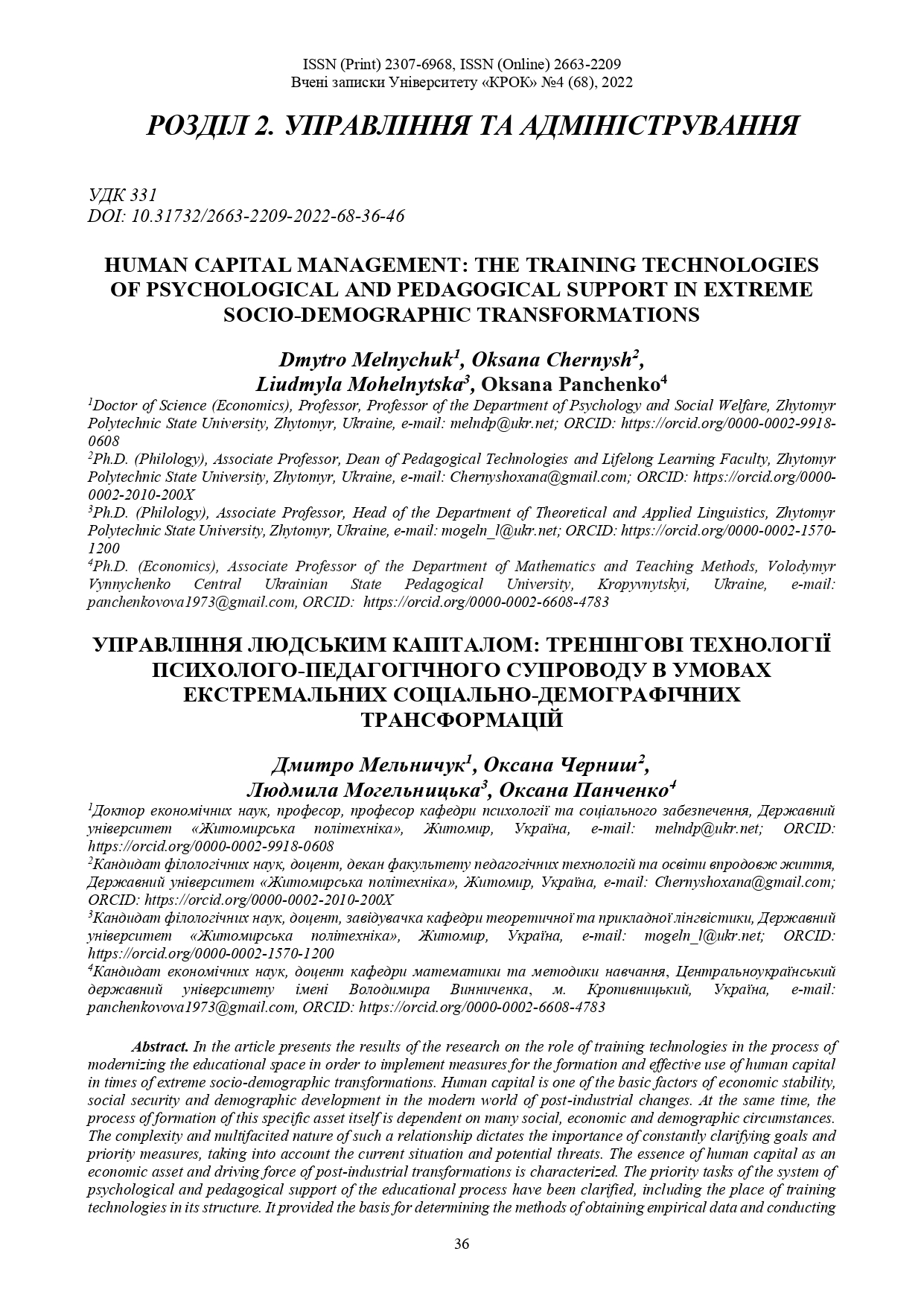HUMAN CAPITAL MANAGEMENT: THE TRAINING TECHNOLOGIES OF PSYCHOLOGICAL AND PEDAGOGICAL SUPPORT IN EXTREME SOCIO-DEMOGRAPHIC TRANSFORMATIONS
DOI:
https://doi.org/10.31732/2663-2209-2022-68-36-46Keywords:
human capital, management, economy and social policy, demographic processes, social transformations, training, psychological support, pedagogical supportAbstract
In the article presents the results of the research on the role of training technologies in the process of modernizing the educational space in order to implement measures for the formation and effective use of human capital in times of extreme socio-demographic transformations. Human capital is one of the basic factors of economic stability, social security and demographic development in the modern world of post-industrial changes. At the same time, the process of formation of this specific asset itself is dependent on many social, economic and demographic circumstances. The complexity and multifacited nature of such a relationship dictates the importance of constantly clarifying goals and priority measures, taking into account the current situation and potential threats. The essence of human capital as an economic asset and driving force of post-industrial transformations is characterized. The priority tasks of the system of psychological and pedagogical support of the educational process have been clarified, including the place of training technologies in its structure. It provided the basis for determining the methods of obtaining empirical data and conducting a formative experiment regarding the feasibility of using training programs in the process of forming human capital in higher education institutions. According to the results of the correlation analysis, the high significance of the training work as a component of the system of psychological and pedagogical support was established. The scientific novelty of the conducted research lies in the fact that the theoretical and methodological approaches to the modernization of the educational space of Ukraine have received further development. The practical significance of the research results is determined by the possibility of applying the formulated theoretical conclusions and empirically obtained data in the process of developing and implementing programs of psychological and pedagogical support for various categories of education seekers, including lifelong education.
Downloads
References
Людський капітал: Безпека, Відновлення, Євроінтеграція. URL: https://forum2022.nqa.gov.ua/?spush=bWVsbmRwQHVrci5uZXQ
Стрижак О.О. Теорія людського капіталу: формування наукової концепції. Економіка розвитку. 2012. № 1(61). С. 24–31.
Schultz Theodore W. Investment in Human Capital. The American Economic Review. 1961. Vol. 51. № 1. Pp. 1–17.
Соціалізація відносин у сфері праці в контексті стійкого розвитку : монографія / А.М. Колот, О.А. Грішнова, О.О. Герасименко та ін.; за наук. ред. А.М. Колота. – К.: КНЕУ, 2010. 348 с.
Becker S.G. Human Capital: Theoretical and Empirical Analysis, with Special Reference to Education. University of Chicago Press. 1993. 390 p.
Мельничук Д.П. Продуктивна зайнятість як передумова функціону¬вання знань у формі капіталу. Демографія та соціальна економіка. 2014. № 2(22). С. 135–144.
Кір’ян Т., Куликов Ю. Формування механізмів захисту населення від фінансово-економічної кризи. Україна: аспекти праці. 2009. № 2. С. 14–20.
Колот А.М., Герасименко О.О. Соціально-трудовий розвиток у ХХІ столітті: до природи глобальних змін, нових можливостей, обмежень і викликів. Демографія та соціальна економіка. 2019. №1 (35). С. 97–125.
Мельничук Д.П. Людський капітал: пріоритети модернізації суспільства у контексті поліпшення якості життя населення : монографія. Житомир : Полісся, 2015. 564 с.
Коростіянець Т.П. Педагогічний супровід студентів в освітніх установах педагогічної вищої освіти. Інноваційна педагогіка. 2019. Вип. 12. Т. 1. С. 111–114.

Downloads
Published
How to Cite
Issue
Section
License
Copyright (c) 2022 Dmytro Melnychuk, Oksana Chernysh, Liudmyla Mohelnytska, Oksana Panchenko

This work is licensed under a Creative Commons Attribution 4.0 International License.

